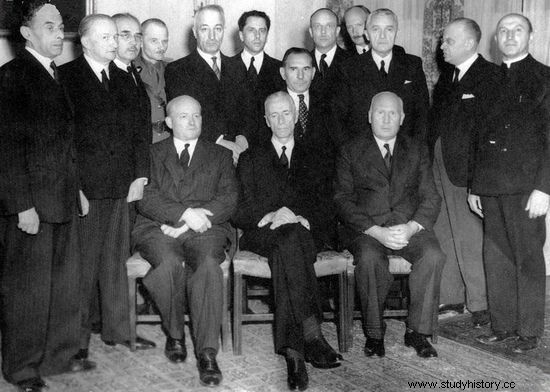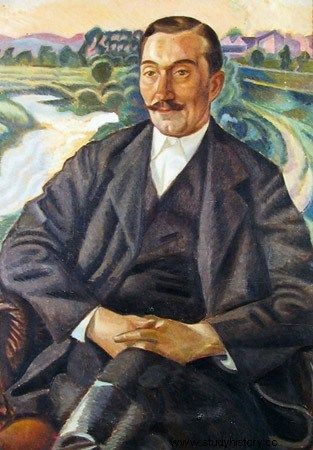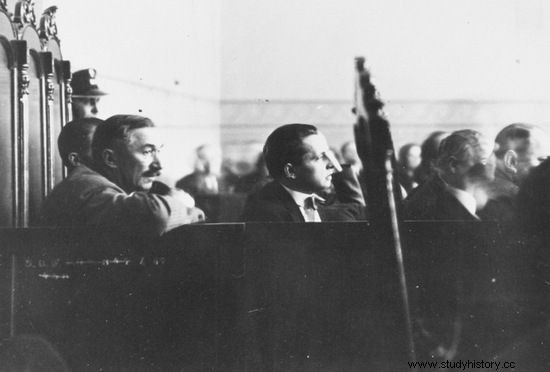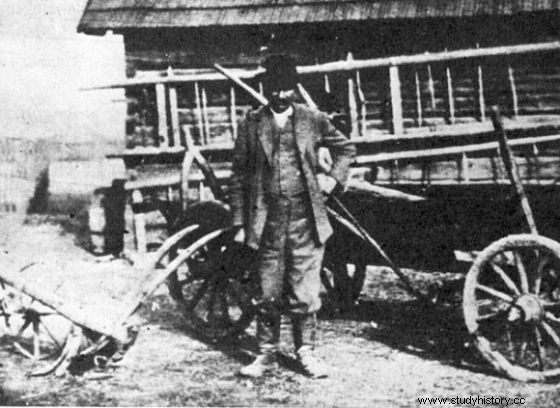Wincenty Witos is a figure well known to everyone who is interested in the recent history of our country. But have you seen that during World War II, in the environment of Prime Minister Mikołajczyk, the idea of taking him from occupied Poland to London was born? Moreover, it was planned that he would replace the ailing Władysław Raczkiewicz as President of the Republic of Poland!
The whole thing began to crystallize in April 1944. It was then that Eugeniusz Bielenin - the pre-war editor of the folk magazine "Piast" and a close associate of Witos - was approached by Jan Witaszek, who, in the words of Bielenin himself, in the underground in Małopolska role . He asked to provide Witos with the offer of the government in exile, at the same time ensuring that, if agreed, the Home Army would take care of securing the entire operation.
Difficult beginnings
Having such a recommendation, Bielenin had no choice but to visit Witos, who at that time - after being released by the Germans from prison - was in his hometown of Wierzchosławice.

The idea of transporting Witos to London was born in the mind of Prime Minister Mikołajczyk (seated first from the left). He wanted the doyen of the people's movement to replace the ailing president Raczkiewicz (sitting in the center).
However, also there, the leader of the peasants was under the watchful eye of the Gestapo, which appointed the village mayor, Czosnyka, as his "guardian". At the same time, the Germans stated that if Witos would leave house arrest without their knowledge, repression would fall on his daughter Julia Masiowa.
Accordingly, he initially gave a very evasive answer, stating that: One who cannot eat needs no bread . Nevertheless, as the front line approached, it became more and more real that the occupiers would want to arrest Witos. Therefore, after a few months - in the fall of 1944 - he decided to travel to London.

Wincenty Witos was already prime minister…
Well, to say and do are two different things. As we know, Witos could not leave his place of residence without the permission of the Germans, so he had to be transported so that the Nazis would not notice it at all. According to earlier assurances, the Home Army took care of it.
The three Skąpski brothers played a key role in the entire complex operation. The development of the plan fell to Władysław, who at that time was an intelligence and counterintelligence officer of the Home Army for the Krakow district. After obtaining the consent of his superiors, he proceeded to act. As Eugeniusz Bielenin writes:
According to the plan prepared by Władysław Skąpski […] his brother, engineer Zygmunt Skąpski […] , he will go to Tarnów by car. After settling some errands in Tarnów, he will be coming back. At the appointed time, Kazimierz Groch [Witos's friend] , waiting in the place where the road forks, will be stopped by a car returning from Tarnów, asking if it would be polite to stray a few kilometers and take the sick old man to Krakow due to the vacancies in the vehicle. Zygmunt Skąpski will give his consent and thus Witos, whom the chauffeur does not know, will be taken to Krakow .
After reaching Krakow, Witos was to live at 39 Starowiślna Street with the third of the Skąpski brothers, Bolesław - a former officer, and before May 1926 an activist of the PSL "Piast". In the event of any unexpected difficulties, he would be transported to Zygmunt Skąpski's apartment at 43 Bronowicka Street.

He was a victim of a campaign ... In the photo Witos during the Brest trial.
The failure of the entire action was also taken into account, for example as a result of Witos being recognized by someone uninitiated. An ambulance car was prepared for such an eventuality, which was to transport him to the clinic, creating the appearance of his sudden collapse and the need to immediately go to the hospital, which was to justify his sudden departure to Krakow.
Mr. Mayor is flying (or not) to London
After the preparation stage, it's time to implement. The whole operation went smoothly on a Sunday in October. In Krakow, Witos stayed as planned with Bolesław Skąpski, where he was given his own room with a separate entrance. He could also use the second room, where he received guests, incl. the two doctors who looked after him (he was seriously ill at the time).
Witos was also visited - twice by the chief of staff and the commander of the Kraków District of the Home Army. During the second meeting, his departure to England was discussed, but to the surprise of the gathered Witos stated - according to Bielenin's account - that uninvited cannot go there. Anyway, he added that he no longer wants honors and is not going to pursue a political career anymore. The meeting is over there.

He could also become president!
Witos' words were immediately sent by radio to London, and after a few days Prime Minister Mikołajczyk responded. It was as follows:
Please, Mr. Mayor not for honors and honors, or for a political career, but we invite you to work hard to serve us with your valuable advice. The flight itself does not present any danger. The most difficult thing is to start from the country, but it will be easier for those under the care of Mr. Wójt.
These assurances reportedly convinced Witos, which was also communicated to London. After all, when information about the planned arrival of the plane came after a few days ... he resigned from going on a trip, explaining it with poor health. Therefore another date has been set.
However, in the meantime, on October 19, the head of the Kraków AK District, Józef Godlewski, was arrested, which caused further complications. Also the place of arrival and departure of the aircraft has been changed. While earlier it was around Tarnów, now the action was to take place in the Kielce region.
After all these perturbations - as Bielenin writes - on November 21, 1944, Witos summoned him to inform him that he had finally decided to leave for England. Now, it would seem, there was nothing to prevent the three-time prime minister from going to the Albion Stoic. Nothing could be more wrong.
Albion not for Mr. Mayor
It is true that Witos was transported without major problems to the manor in Słupia (Włoszczowa poviat), where he was to wait for the plane to arrive, hiding under the name of Jan Nowak, but he was not allowed to leave the country.
In the first place, the rainy autumn prevented the plane from landing and taking off, to make matters worse, on November 26, the London radio announced the resignation of Mikołajczyk's government, and it was he who issued the invitation. In this situation, the long-planned operation was abandoned, and Witos himself, fearing arrest, was transported on December 16, 1944 to the Rożenek estate in today's Łódź Province, where he was in hiding until the Red Army entered.
The whole thing also had a sad aftermath. Intrigued by Witos's disappearance, the Germans fulfilled their “promise” and arrested his daughter, who was interrogated for several hours at the Krakow Gestapo headquarters at 2 Pomorska Street, asking about her father's whereabouts. Ultimately, when the Gestapo men did not receive a satisfactory answer, it was decided to send her to the Belsen concentration camp. - Bergen, from where she did not return until the end of the war.
Sources:
The article was written mainly on the basis of the memoirs of Eugeniusz Bielenin entitled Sketches from the past (People's Publishing Cooperative, 1980). The author also used: About Wincenty Witos. Accounts and memories , collected and edited by Jan Borkowski, Ludowa Spółdzielnia Wydawnicza, 1984.
